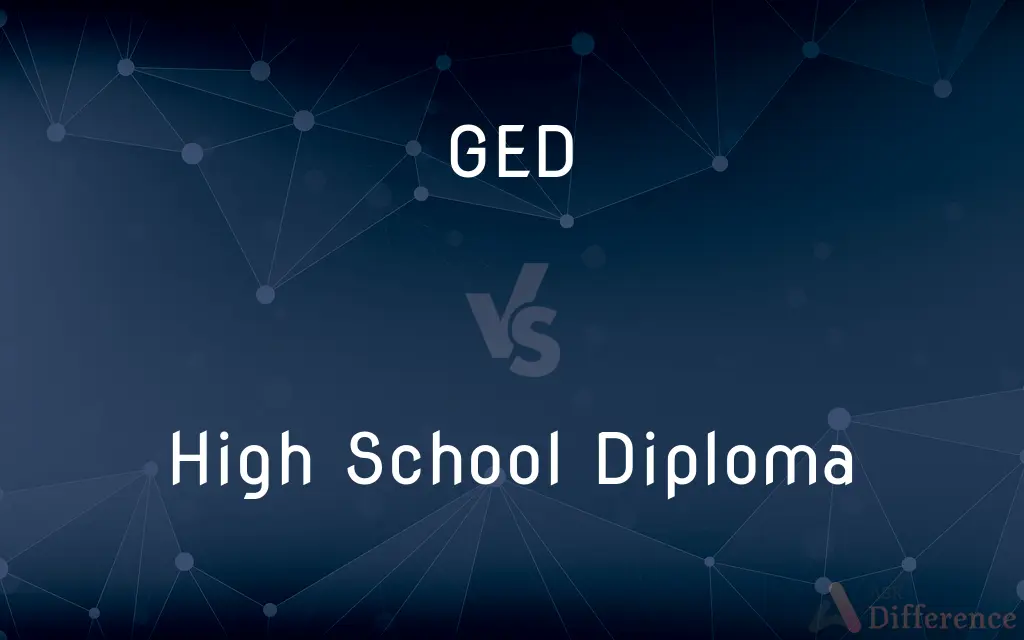GED vs. High School Diploma — What's the Difference?
By Tayyaba Rehman — Published on January 23, 2024
A GED is a testing program that certifies high school academic skills, while a High School Diploma is awarded after completing coursework at a high school.

Difference Between GED and High School Diploma
Table of Contents
ADVERTISEMENT
Key Differences
A General Educational Development (GED) certificate is earned by passing a series of tests that demonstrate high school-level academic skills, whereas a High School Diploma is awarded to students who complete the required coursework and credits at a high school.
The GED tests cover four main areas: Reasoning Through Language Arts, Mathematical Reasoning, Science, and Social Studies. In contrast, a High School Diploma involves a broader curriculum, including elective courses, over a typical four-year period.
GED holders often pursue the certificate later in life, perhaps after dropping out of traditional high school, while High School Diplomas are typically earned by students in their late teens as part of the standard education system.
Colleges and employers generally accept a GED as equivalent to a High School Diploma, although some may give preference to a Diploma due to the extended time and diverse subjects studied in high school.
The GED offers flexibility and is often pursued by those needing to balance education with other responsibilities like work or family. A High School Diploma follows a more structured and socially interactive educational environment.
ADVERTISEMENT
Comparison Chart
Nature of Achievement
Series of tests certifying high school skills
Completion of high school coursework
Curriculum Coverage
Four main areas
Broad curriculum including electives
Typical Age of Completion
Any age, often adults
Teenagers
Recognition
Equivalent to high school education
Standard high school education
Learning Environment
Self-paced, flexible
Structured, classroom-based
Compare with Definitions
GED
GED is a test-based certification for high school academic skills.
After getting her GED, she applied to college.
High School Diploma
A High School Diploma is recognized in colleges and workplaces.
Her High School Diploma helped her secure a college admission.
GED
GED covers four main academic areas.
He studied hard for the GED math section.
High School Diploma
A High School Diploma involves a variety of subjects.
His High School Diploma included advanced science courses.
GED
GED offers an alternative to traditional high school education.
She chose to pursue a GED to accelerate her education.
High School Diploma
A High School Diploma follows a structured educational path.
She appreciated the structured learning of her high school years leading to her diploma.
GED
GED can be completed at any age.
At 30, he successfully completed his GED.
High School Diploma
A High School Diploma is awarded after completing high school.
She received her High School Diploma with honors.
GED
GED is recognized as high school equivalency.
His GED was accepted by the employer as equivalent to a high school diploma.
High School Diploma
A High School Diploma is typically earned by teenagers.
He earned his High School Diploma at 18.
Common Curiosities
How long does it take to get a GED?
It varies, but many people can prepare for and pass the GED tests within a few months.
Can adults earn a High School Diploma?
Yes, adults can return to high school or attend adult education programs to earn a High School Diploma.
What are the age requirements for taking the GED?
Typically, you must be at least 16 years old to take the GED, but this can vary by state.
Is a GED equivalent to a High School Diploma?
Yes, a GED is generally considered equivalent to a High School Diploma in terms of academic knowledge.
What subjects are covered in the High School Diploma curriculum?
In addition to core subjects like math, science, and language arts, it often includes electives in arts, technology, and other areas.
Is a High School Diploma more valued than a GED?
Some employers and colleges may prefer a High School Diploma due to the broader educational experience it represents.
Can you go to college with a GED?
Yes, most colleges accept a GED for admissions, similar to a High School Diploma.
Does the GED test include electives like a High School Diploma?
No, the GED focuses on core academic skills and does not include elective subjects.
How is a GED viewed in the job market?
Many employers view a GED as equivalent to a High School Diploma, although individual preferences can vary.
Do colleges offer scholarships to GED graduates?
Yes, many colleges offer scholarships to students with a GED, similar to high school graduates.
Is it faster to get a GED than a High School Diploma?
Generally, yes. The GED can be a faster path to equivalency, especially for adults.
Can homeschoolers get a High School Diploma?
Yes, homeschooled students can earn a High School Diploma, typically through their state's homeschooling regulations.
Does a GED have different levels of passing like a diploma?
The GED has a passing score, but not different levels of passing as in high school grading systems.
Can I get a GED online?
You can study for the GED online, but the tests must be taken in person at an authorized testing center.
Are there different types of High School Diplomas?
Yes, some high schools offer different diploma tracks, like vocational, general, or college preparatory.
Share Your Discovery

Previous Comparison
VNC vs. UltraVNC
Next Comparison
Maida vs. Wheat FlourAuthor Spotlight
Written by
Tayyaba RehmanTayyaba Rehman is a distinguished writer, currently serving as a primary contributor to askdifference.com. As a researcher in semantics and etymology, Tayyaba's passion for the complexity of languages and their distinctions has found a perfect home on the platform. Tayyaba delves into the intricacies of language, distinguishing between commonly confused words and phrases, thereby providing clarity for readers worldwide.













































